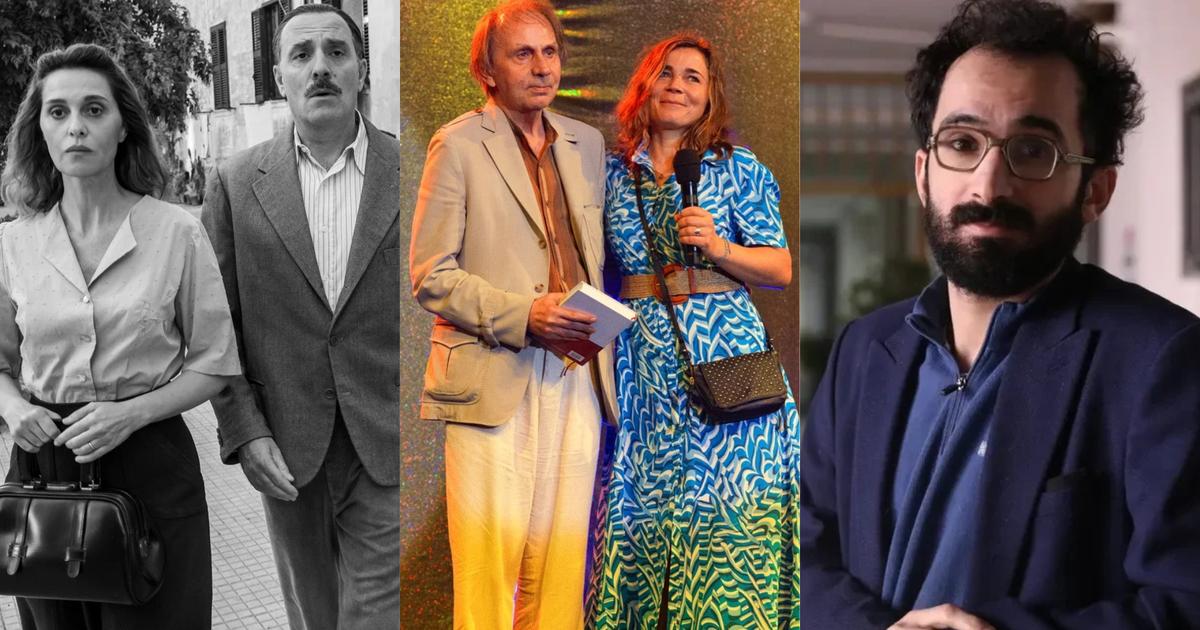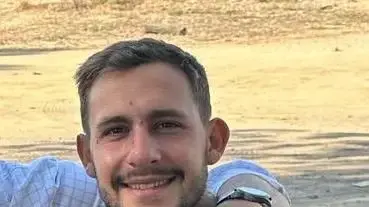When several days go by and Serhii does not send a kitten meme or an emoji with flowers wishing him good night, María Sahuquillo, who was a correspondent for four years in Moscow, worries: "Is everything okay?"
“
Bso bude dobre
”, Everything will be fine, answers the Ukrainian military veteran he met in the war.
Boris, however, has not responded to messages from Luis Doncel for weeks, who spoke with this young LGTBI activist in kyiv when he was sent as a special envoy in July.
The interviewee was very nervous, the next day he was going to the front of Donbas.
The journalist trusts that he has not been one of the 100,000 Ukrainian victims who, between wounded and dead, have already claimed the conflict.
Seven of the fifteen journalists from EL PAÍS who have covered the invasion of Ukraine since February 24, have brought to the Caixaforum auditorium in Madrid this Sunday the stories of those who knew and could not forget.
A woman who takes care of flowers surrounded by rubble in Kramatorsk, an old woman who cooks soup with nothing at the border, some children playing soccer among the tanks of Lviv.
"Minimum details that do not always fit in the chronicles," says Pepa Bueno, director of EL PAÍS, when presenting
Stories of a war,
an event attended by authorities such as the Vice President of the Government and Minister of Labor, Yolanda Díaz and the Minister of Defense, Margarita Robles, and around 200 of the 250,000 subscribers of EL PAÍS to whom the director dedicated the event, since, without their support, the newspaper could not have recounted the conflict on the ground.
From the start it is clear that this is not a typical conference: on an empty stage, a pile of pine chairs and a traditional Ukrainian theme played on the violin by Teresa Gamaza Acuña, suddenly interrupted by the chaotic noise of war.
Under the artistic direction of the actor Raúl Fernández de Pablo and the editorial baton of Mónica Ceberio, deputy director of EL PAÍS, journalists are taking center stage with totally different stories, but equally full of humanity.
From the left, standing, the journalists Óscar Gutiérrez, Cristian Segura, Mónica Ceberio (deputy director of EL PAÍS and in charge of the editorial content of the event), the Minister of Defense, Margarita Robles, the director of EL PAÍS, Pepa Bueno, María R. Sahuquillo, the Vice President of the Government, Yolanda Díaz, Jacobo García, Lucía Abellan (Internacional editor-in-chief) and Raúl Fernández de Pablo, artistic director of the assembly.
Bent over, Albert Garcia and Luis Doncel. Álvaro García
The only photographer in the group, Albert Garcia, remembers how he was shot by 10 soldiers in the "grey zone" of Donetsk.
A space between two opposing
checkpoints
, where a maneuver as simple as turning around can become "an extreme situation".
"He was so blocked that he wasn't even afraid," says Albert, who confesses that the best way to calm down in the midst of the chaos was to "look at Maria's smile."
María is María Sahuquillo, who retraces her years in the region through the smells of before and after the conflict.
Then: the fruity vapers in kyiv nightclubs, the clean snow and pickles of the Zaporizhia circus.
Afterwards: the dust from the collapsed buildings, the smell of the feet of people sleeping in the Kharkov subway, and the fear in that same circus in Zaporizhia, already converted into a reception center for refugees from Mariupol.
Cristian Segura arrived at the war knowing that between the whistle of a missile and its fall, three seconds pass "that you should use to lie face down on the ground, with your hands over your head."
"But between theory and practice, it's a world away," he says.
In the end, prompted by the whistling of the missiles, he went back to smoking.
Everyone protects themselves as they can.
"Imagine that you are seven, eight, nine years old and suddenly... boom!" says Óscar Gutiérrez, startling the audience before saying that he was impressed by how parents, aid workers and psychologists told children that the sound of the bombs was fireworks to allow them to remain so.
“In the most screwed-up moments, only individual dignity remains,” says Jacobo García, who found it in Natalia, the gardener who tended the Kramatorsk gladioli and chrysanthemums when there was no one left.
What worried him about the war was the aphids and the lack of water.
Also because it was what made her human, an individual.
Boris, who had left "the typical life of a 26-year-old gay in a European capital" to enlist in the army, made Luis Doncel reflect: "I thought about how two concepts that for me had nothing to do with it, the defense of sexual freedom and war, for him they were two sides of the same coin.
Days later, he asked the first lady Olena Zelenska why Boris, who was risking his life for his country, could not marry her boyfriend, because one injustice should not silence another.
05:39
Luis de Vega participates in 'Stories of a war'
The last intervention, on video from kyiv, is by Luis de Vega, who tells that when he arrived in Ukraine, just before the war, the airline lost his suitcase.
He lived, without luggage, the exodus from Mauripol, the blowing up of the Irpin bridge, he saw families lose everything from one day to the next.
And he understood that most of the things we carry in our suitcases are not necessary.
Among the public, much surprise at the format and emotion at the content.
Annik Laval, 77, liked the "sober and professional" show, and Alberto Díez, 55, points out that "the work behind it was noticeable."
Ana Rosa García, 55, who admits to having cried with Boris's story, appreciates "the more human than journalistic point of view."
Carmen Gil Molinero, 58, extrapolates "the sensitivity" of the assembly to that of EL PAÍS, adding: "You imagine them there when you hear them tell it."
Raquel Campoy, 25, is clear: "I've had goosebumps all the time."


/cloudfront-eu-central-1.images.arcpublishing.com/prisa/6W4SMYBAI2LINU6NNHK25NV2MY.jpg)
/cloudfront-eu-central-1.images.arcpublishing.com/prisa/SELJZCEZBNDZBPMNSIAZKYPXGE.jpg)








/cloudfront-eu-central-1.images.arcpublishing.com/prisa/KMEYMJKESBAZBE4MRBAM4TGHIQ.jpg)


